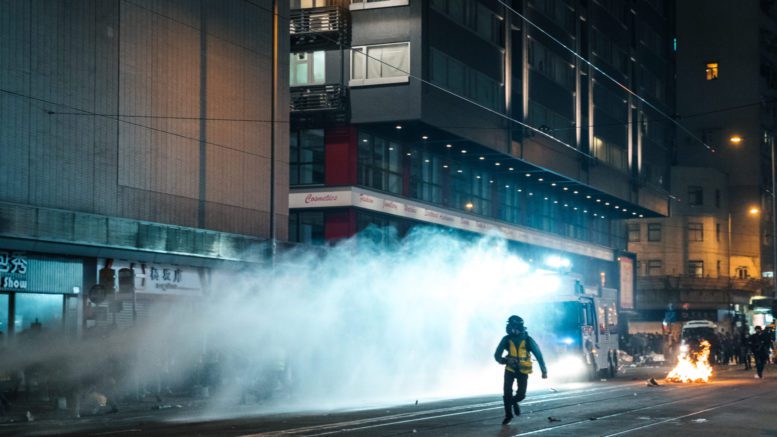A wave of political tension has swept Hong Kong since 2019, from the proposal of the anti-extradition bill movement to the outbreak of COVID-19, followed by the implementation of National Security Law.
The frequent use of chemicals weapons such as pepper spray and tear gas by the Hong Kong Police Force has left journalists no choice but to use respirators even before the novel coronavirus pandemic began.
“I have been wearing full face respirators since last year,” said Rachel Wong in an interview with The Toronto Observer. “Sometimes it can be quite suffocating and is especially hard during summer. Since COVID-19 later broke out, we have been wearing clinical masks when working on the frontline and sometimes indoor at press conferences since February.”

Wong is a frontline journalist at the Hong Kong Free Press, an English-language and online media outlet based in the city. Wong first worked as a freelance reporter and as a fixer (who helps foreign journalists to arrange a story) for foreign media outlets before working at the HKFP but later found her interest in covering the ongoing political movements in Hong Kong.

Wong thinks that COVID-19 has not affected the journalism industry in Hong Kong, but as a frontline reporter who has close contact with the public, she is conscious of her personal hygiene.
“Hong Kong Chief Executive Carrie Lam used to hold weekly press conferences before the Executive Council meeting in a small lobby, but around March or April, they have changed the venue to an auditorium, where reporters will be asked to space out and sit apart from each other to avoid the transmission of virus,” said Wong.
Hong Kong citizens are worried about the potential threat against freedom of the press in Hong Kong, and Wong has already covered the abuse of journalists in a recent story for the HKFP.
“Police officers were antagonizing reporters and thought that reporters are obstructing them from doing their duties. I had witnessed reporters being dragged to a cordoned off area in Mong Kok a month ago, and they were asked to kneel down and switch off their cameras,” Wong said.
“We made ourselves identifiable by wearing press vest because we wanted to keep ourselves safe as journalists, but it seems like it had become a label for us to be easily picked out.”
Meanwhile, Joy Pamnani, a fourth-year journalism student at the University of Hong Kong graduating in December, has come to a decision to not work in the journalism industry.

Pamnani was a freelance writer for the South China Morning Post, the Correspondent, and Hong Kong Youth Magazine, but she thinks that journalism has changed a lot in Hong Kong while the freedom of press under the ‘one country, two systems’ constitutional principles is vague.
This constitutional principle was formulated by the People’s Republic of China for the governance of Hong Kong as a special administrative region, with the enactment of the Basic Law which granted freedom of press to the city.
“The past year of journalism has been pretty crazy because of the social unrest and COVID-19, and I’d say the phase is not that great in comparison to other jobs,” said Pamnani in a Zoom interview.
“I feel like I would rather use my communication skills to spread happy news than to spread news on how my own city is getting burnt out to pieces.”
Pamnani is now an area director of the Hong Kong Toastmasters Club District 89.
Hong Kong citizens might have been less affected by the pandemic because of its demographics, but a long road lies ahead for Hong Kong citizens and journalists who want to defend democracy.

